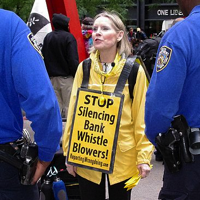From revelations about illegal arms sales to leaks to the media about military misconduct in Iraq, whistleblowing by both private and public sector employees has increasingly become a powerful, if often controversial, form of dissent.
The United Nations, the Organization for Economic Cooperation and Development (OECD) and other intergovernmental bodies have recognized that there is indeed a right to expose corruption, wrongdoing by public bodies, serious threats to health, safety or the environment, and breaches of human rights or humanitarian law. Whistleblowing is protected by both the individual’s right to freedom of expression as well as the public’s right to have access to information held by public authorities. This protection is subject to only very limited exceptions, when secrecy is necessary to protect compelling public or private interests.
The vexing question is: How should those limited exceptions be defined?

